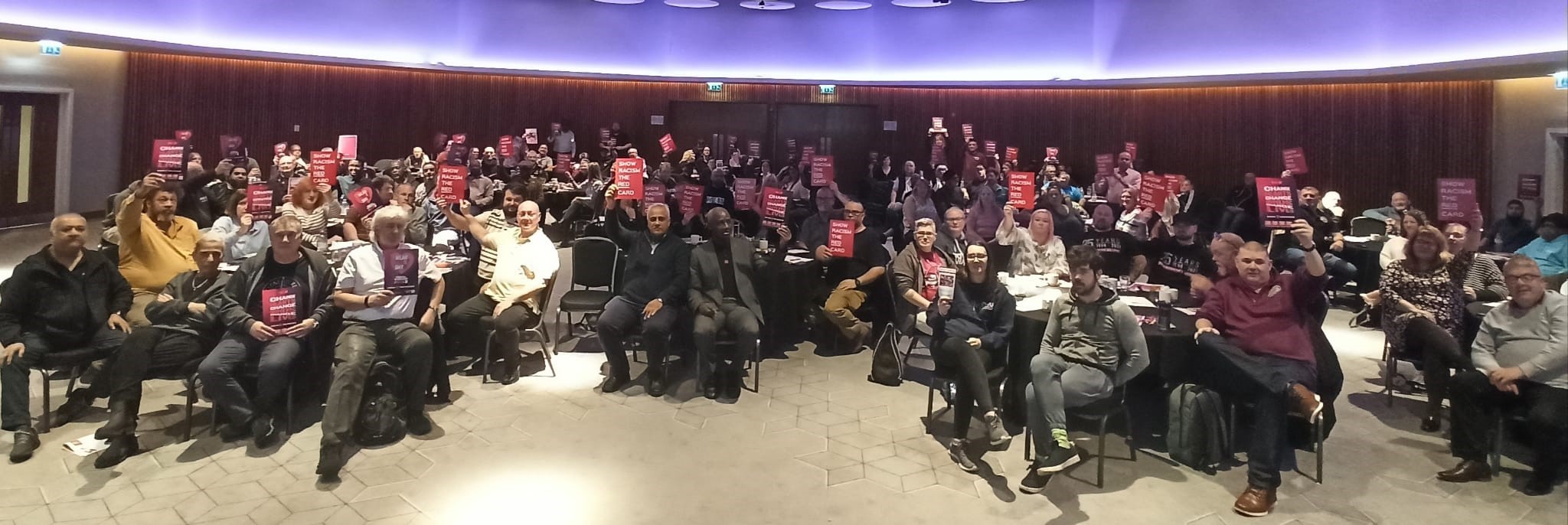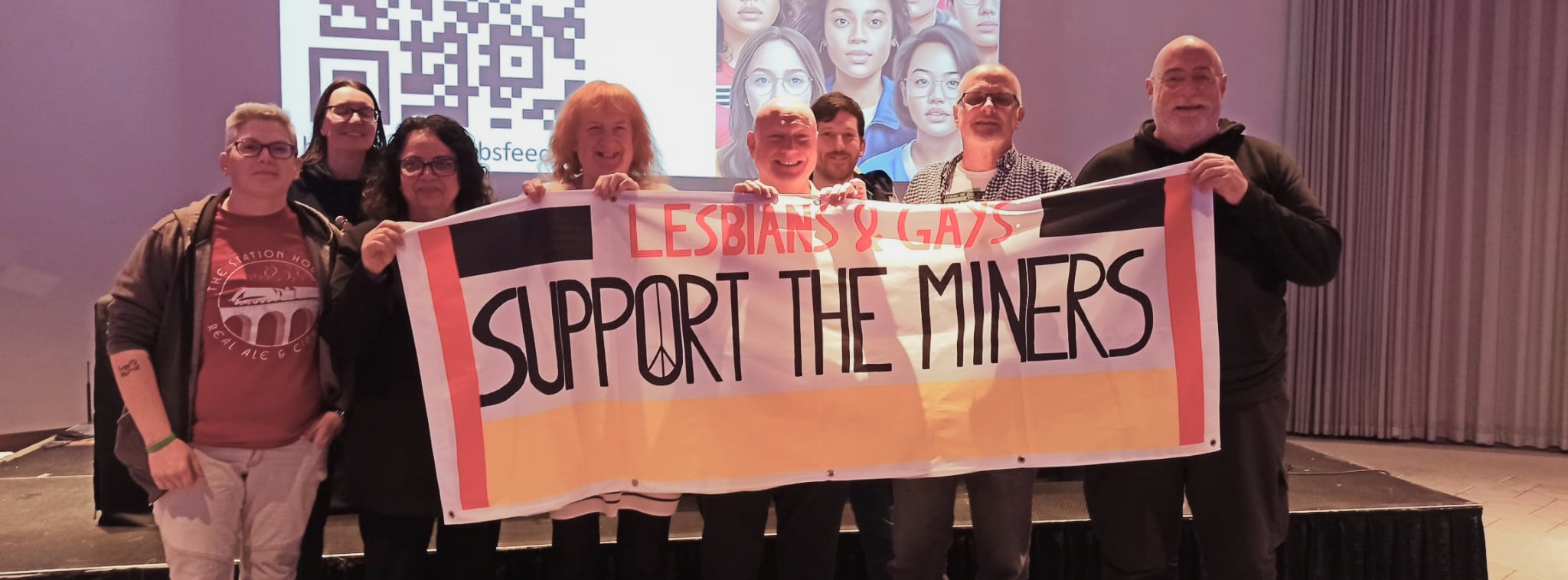National Equality Event 2024
October 24 2024
On the 21st October 2024, the CWU held its 2nd National Equality event at the Crown Plaza Hotel in Newcastle. Over 120 CWU members and activists were in attendance. The event was opened by Trish Vollans, CWU Acting Regional Secretary for the North East, who reminded attendees of the importance of diversity and the significance of understanding the variety of views and common interests shared by CWU members. Providing an overview of the equality leads and the work being carried out in the Northeast region such as its work on miscarriage and employment rights before 24 weeks of pregnancy and “Women’s Street Watch”. Trish’s contributions were followed by an inspiring video showcasing the work of the National Equality and Education department and CWU equality leads and activists over the last year.
The first item on the programme’s agenda was a presentation by Sondos Bower, Ambassador from Karma Nirvana charity. Founded in 1993, Karma Nirvana charity provides helplines for male and female victims of Honour Based Abuse (HBA) and Forced Marriages (FM). Sondos, shared victim stories, including her own personal story of HBA after years of abuse for being in a relationship that was not approved of by her family. Highlighting the Channel 4 documentary “The Push” Sondos emphasised that victims of HBA are more than 7 times more likely to be abused by multiple perpetrators. Reaching out to delegates, Sondos made a plea for branches to support the charities efforts by keeping an eye out for the signs, challenging behaviours and promoting cultural change.
The second session was presented by Neil Guss, Regional Employments Rights Manager from Thompsons Solicitors. Neil provided delegates with an update on the Equality Act 2010 regarding disability. Drawing on recent Employment cases Neil highlighted that, in the case of Rentokil Initial UK v Mr M Miller [2024] IRLR 628, the EAT held that a trial period can be a reasonable adjustment, although this is dependent on the particular facts of the case. Another case brought to delegates attention was Fernandes v DWP w [2023] EAT. In this case Ms Fernades suffered from depression, anxiety, and back pain and faced issues with the provision of necessary ergonomic equipment and adjustments upon her return from maternity leave. In its decision the EAT ruled it was outside the time limits, highlighting the importance of timely action by employers in making reasonable adjustments for disabled employees. In closing Neil provided delegates with information to help reps identify whether an adjustment is reasonable and how to represent members on disability issues related to reasonable adjustment.
An informative session from Vic Jones, Senior Policy Officer TUC Equalities, updated delegates on the employment rights bill – born out of a CWU motion to TUC congress in 2016, calling for a new deal for workers. Vic gave a comprehensive overview of the bill, from banning zero-hour contracts, which disproportionality affect BAME workers (according to the TUC 1 in 6 BAME workers are employed on Zero-hour contracts); to advancing statutory sick pay by making it a day one right for all workers -benefiting approximately 7 million workers, of whom are predominantly women. Day one of the national equality event closed with a live educational performance from Banner Theatre on the historical struggles and victories of the trade union movement, mainly focusing on Orgreave to mark its 40th anniversary.

Day 2 of the Equality event started with Ray Goodspeed from Lesbian and Gay Support the Miners (LGSM) an alliance group who supported the National Union of Mineworkers during the year-long strike of 1984–1985. Ray informed delegates that the LGSM were the first support group that began raising money for striking miners. By the end of the strike, eleven LGSM groups had emerged in the UK and the London group alone raised over £20,000. Ray explained, the LGSM’s efforts were not just about financial aid; they also fostered a strong bond between the miners, the LGBTQ+ community and the labour movement. This solidarity led to lasting changes in public perception and policy, including the NUM’s support for LGBTQ+ rights at Labour Party conference. The story of LGSM was famously depicted in the 2014 film “Pride,” which highlighted the group’s impactful journey and the mutual support between the miners and the LGBTQ+ activists.
The second item on the agenda introduced John Page from the Ella Baker School of Organising, an organisation which focuses on training trade union activists and organisers. John’s presentation centred on the rise of the far right and why the trade union movement must organise for change. In his contributions John drew on current economic changes, such as privatisation, the depletion of public services and the rise of insecure work (9 million people are now employed in the gig economy) and poverty (4.3 million people now live in poverty). John reminded delegates that working class people have more in common, than what divides us. The session included an interactive activity where delegates gave insightful contributions on why narratives of division were growing within our communities, triggering racist narratives.

Ged Grebby CEO of Show Racism the Red Card (SRtRC) & Gary Bennet, ex-professional footballer and anti-racist activist from SRtRC informed delegates of their campaigning aims to address racism by using professional footballers as anti-racist role models. Ged explained that as well as using role models from the across the sporting and entertainment world, SRtRC are active in schools and trade unions. Gary made a memorable contribution by sharing his story of facing racism in sport. Gary’s experiences with racism date back to his playing days in the 1980s, where he faced significant abuse, including monkey chants and racial language on the pitch. Another incident Gary recalled was when he and his black girlfriend were singled out and asked to leave a working men’s club due to their race. Gary recalled frequently being stopped by the police and questioned about his whereabouts, simply because of being a black man in a predominantly white area. These experiences fuelled his commitment to fighting racism in football.
The afternoon session included a session from Kim Mitchell, CEO and co-founder of TIC Yorkshire, a charity dedicated to supporting individuals and families affected by Tourette Syndrome and other tic disorders. Kim started TIC Yorkshire following her son’s diagnosis and to address the lack of awareness and support for Tourette Syndrome in her community. The charity currently supports over 1700 members and families and delivers awareness talks to organisations and schools across the UK. In her contributions Kim educated delegates on the different types of TIC conditions, Symptoms, and the diagnostic process.
The last session was an interview with Deeba Syed, Senior Legal Officer for Rights of Women a charity-based organisation born out of the women’s liberation movement. Rights of Women provides free legal advice and support to women, particularly those experiencing violence and discrimination. In her contributions Deeba provided an update on sexual harassment in the workplace, highlighting recent case studies at McDonalds, the MET police and fire and ambulance services where employers are extremely reluctant to deal and address sexual harassment in the workplace. In response to the poor cultures, Deeba drew attention to the formation of This Is Not Working Alliance – a coalition of over 20 unions, charities, and women’s rights organisations dedicated to combating workplace sexual harassment. Deeba explained that the coalition as well as other unions and organisations, have been instrumental in advocating stronger legal protections and employer responsibilities such as the Worker Protection Act 2023(Amendment of Equality Act 2010)– a significant piece of legislation aimed at preventing sexual harassment in the workplace. In her closing remarks Deeba called for more workplace evidence and research emphasising that trade unions played a key role in that process.
Kate Hudson, Head of CWU Equality, Education and Development closed the event by thanking delegates in attendance. Kate provided an overview of the last two days, including the work of the department. Kate encouraged everyone to attend the Anti-Racism Rally on the 26th October, of which the General Secretary will be a key speaker. In her closing contributions Kate said “we must stand together as a movement, must not be divided and we must stand tall and be proud of what we stand for and who we are because if we don’t the narrative of hate will win”.



